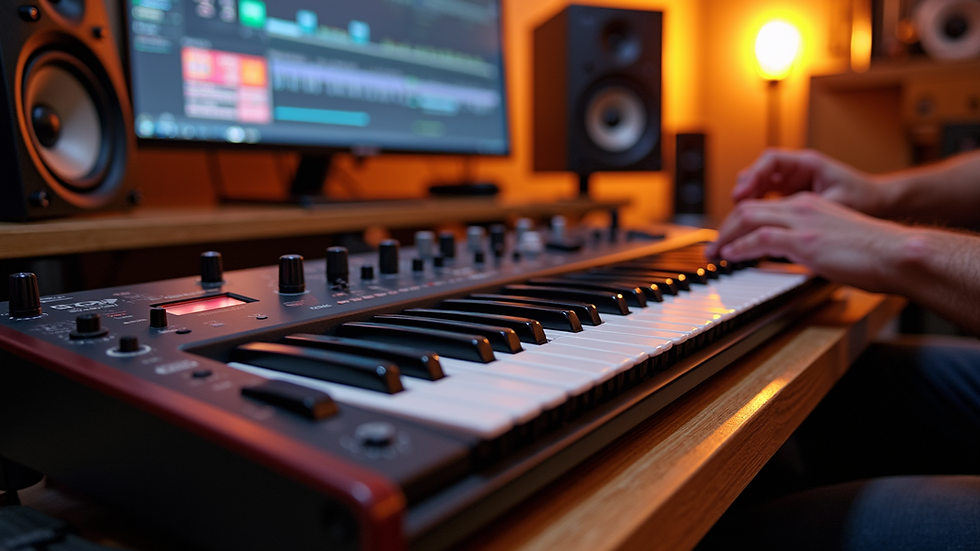Mastering Music Production Techniques
- nicolas Essig
- Aug 18, 2025
- 3 min read
Diving into music production can feel overwhelming at first. But trust me, with the right approach, you can master the craft and create tracks that truly stand out. I’ve been there, and I want to share practical tips that helped me learn music production skills quickly and effectively. Whether you’re just starting or looking to sharpen your abilities, this guide will walk you through essential steps to elevate your sound.
How to Learn Music Production Skills Effectively
Learning music production skills is all about building a solid foundation and practicing consistently. Here’s how I approached it:
Start with the basics: Understand the core elements like rhythm, melody, harmony, and arrangement. These are the building blocks of any track.
Choose your DAW wisely: Pick a digital audio workstation (DAW) that suits your style. Popular options include Ableton Live, FL Studio, and Logic Pro. Spend time exploring its features.
Watch tutorials and read guides: There are tons of free resources online. Follow step-by-step tutorials to get hands-on experience.
Experiment with sounds: Don’t be afraid to try different instruments, synths, and effects. This helps you discover your unique style.
Practice regularly: Set aside time daily or weekly to work on your projects. Consistency is key to improvement.
By focusing on these steps, you’ll build confidence and develop a workflow that works for you.

Essential Gear and Software to Boost Your Music Production Skills
You don’t need expensive equipment to start, but having the right tools makes a big difference. Here’s what I recommend:
Audio Interface: This device connects your instruments and microphones to your computer. It improves sound quality and reduces latency.
Studio Monitors or Headphones: Good monitors or headphones help you hear your mix clearly. Avoid cheap earbuds for critical listening.
MIDI Controller: A keyboard or pad controller lets you play melodies and beats more naturally.
DAW Software: As mentioned, pick a DAW that fits your workflow. Most offer trial versions, so test a few before committing.
Plugins and VSTs: These add effects and instruments to your DAW. Start with free plugins and upgrade as you grow.
Investing in these essentials will make your production process smoother and more enjoyable.


Step-by-Step Guide to Creating Your First Track
Creating your first track can be exciting and intimidating. Here’s a simple process I follow to keep things manageable:
Choose a genre and tempo: Decide the style and speed of your track.
Lay down a drum pattern: Start with a basic beat to set the rhythm.
Add a bassline: Create a groove that complements the drums.
Build melodies and harmonies: Use synths or instruments to add musical interest.
Arrange your track: Structure your song with intro, verse, chorus, and outro.
Mix your track: Balance levels, pan instruments, and apply effects like EQ and reverb.
Master your track: Finalize the sound to ensure it’s polished and loud enough.
Breaking the process into clear steps helps you stay organized and focused.
Tips to Improve Your Mixing and Mastering Skills
Mixing and mastering are crucial to making your music sound professional. Here are some tips that helped me improve:
Use reference tracks: Compare your mix to songs you admire to guide your decisions.
Keep your mix balanced: Make sure no instrument overpowers others unless intended.
Apply EQ carefully: Cut unwanted frequencies instead of boosting too much.
Use compression wisely: Control dynamics without squashing the life out of your track.
Take breaks: Your ears get tired, so step away regularly to maintain perspective.
Learn mastering basics: Use tools like limiters and multiband compressors to finalize your track.
Mastering these skills takes time, but each session will teach you something new.
Keep Growing and Stay Inspired
Music production is a journey, not a destination. Keep exploring new techniques, collaborating with others, and pushing your creative boundaries. Remember, mastering music production techniques is about enjoying the process as much as the results. Stay patient, stay curious, and most importantly, have fun making music!




Comments